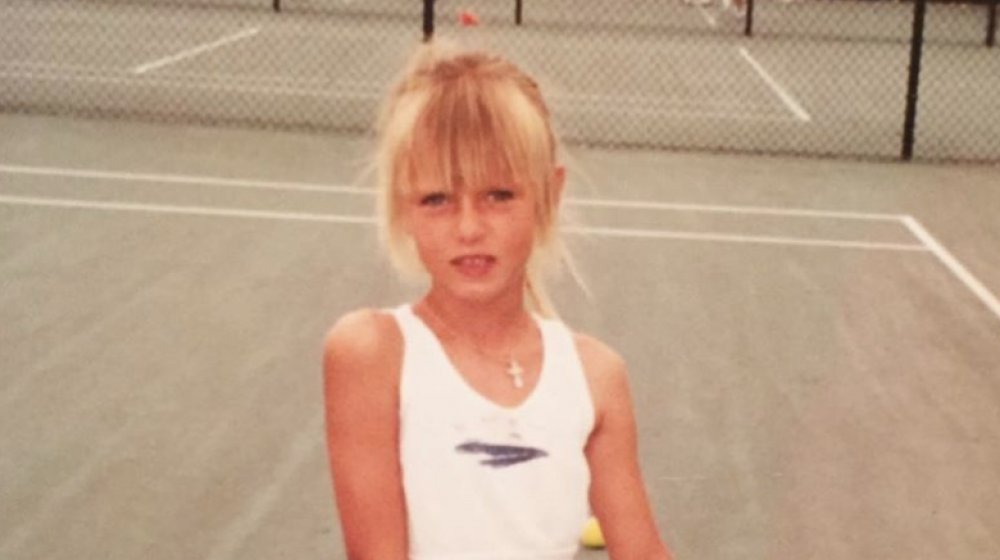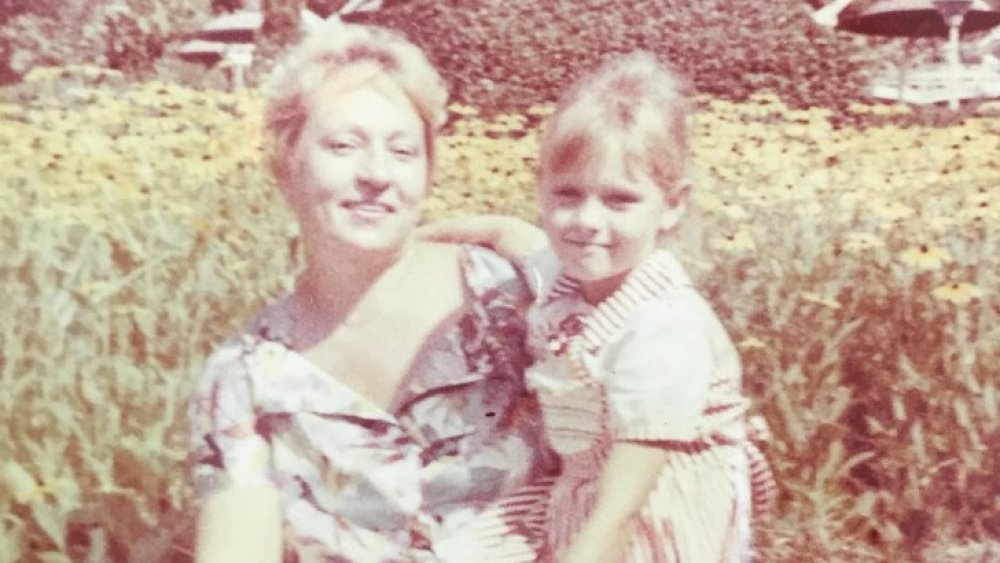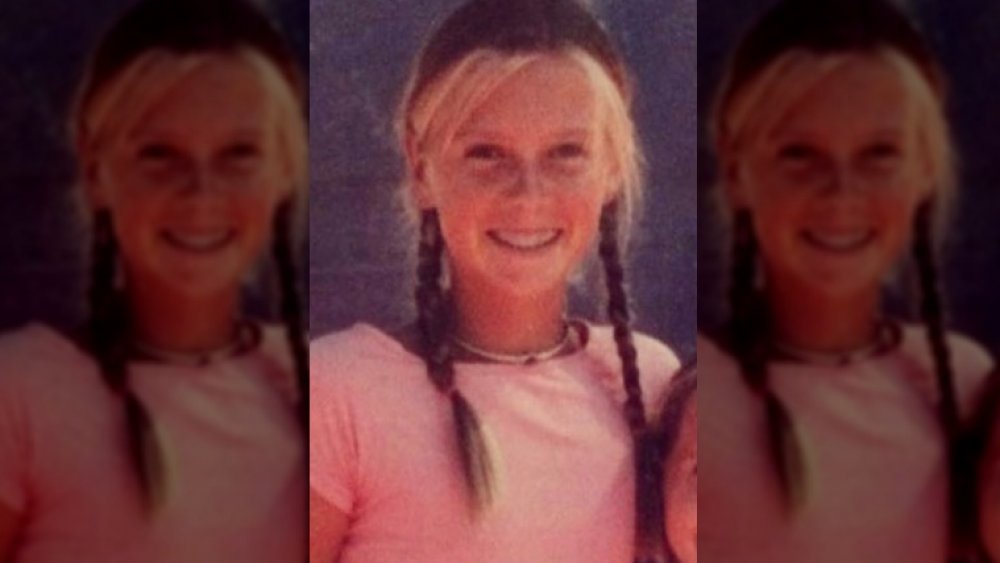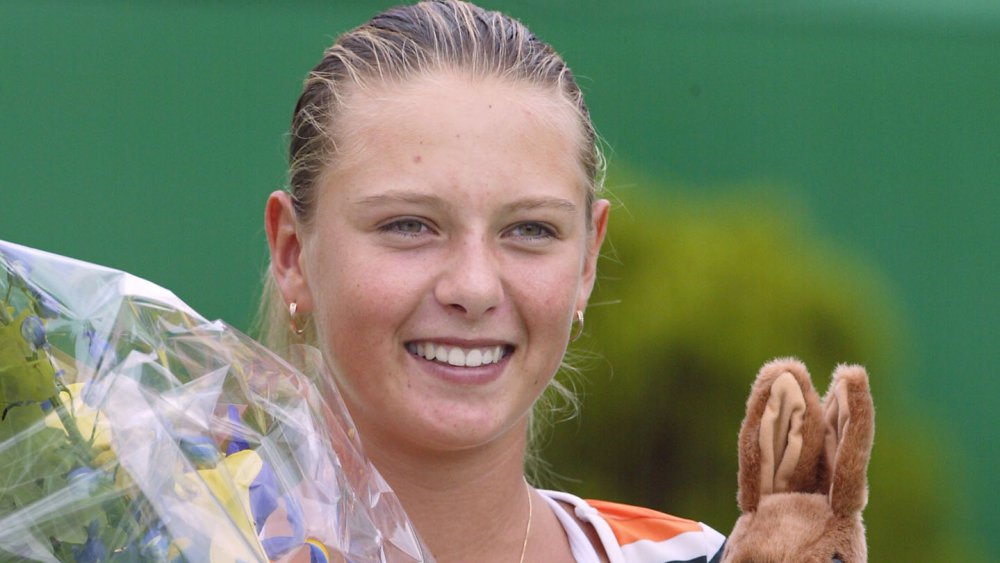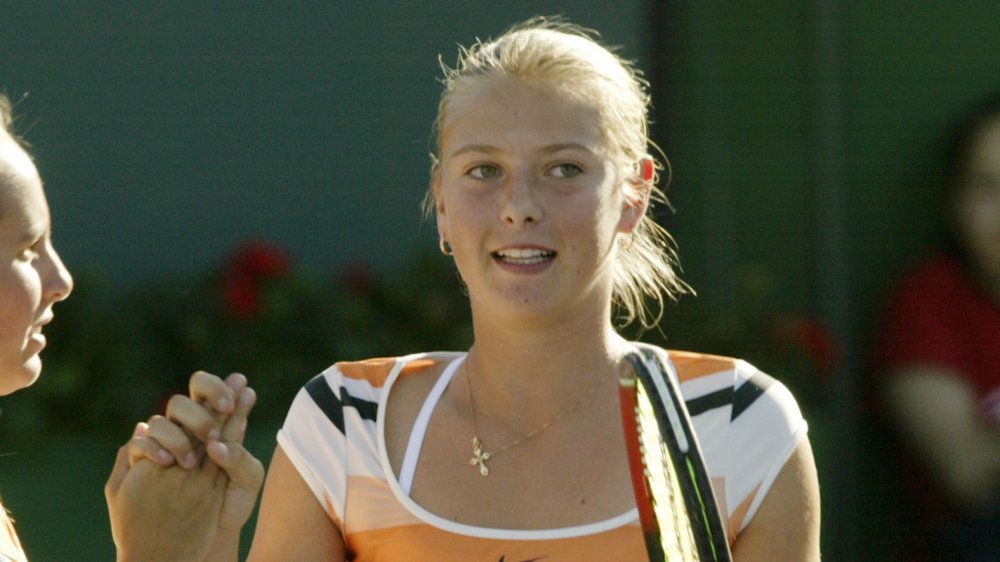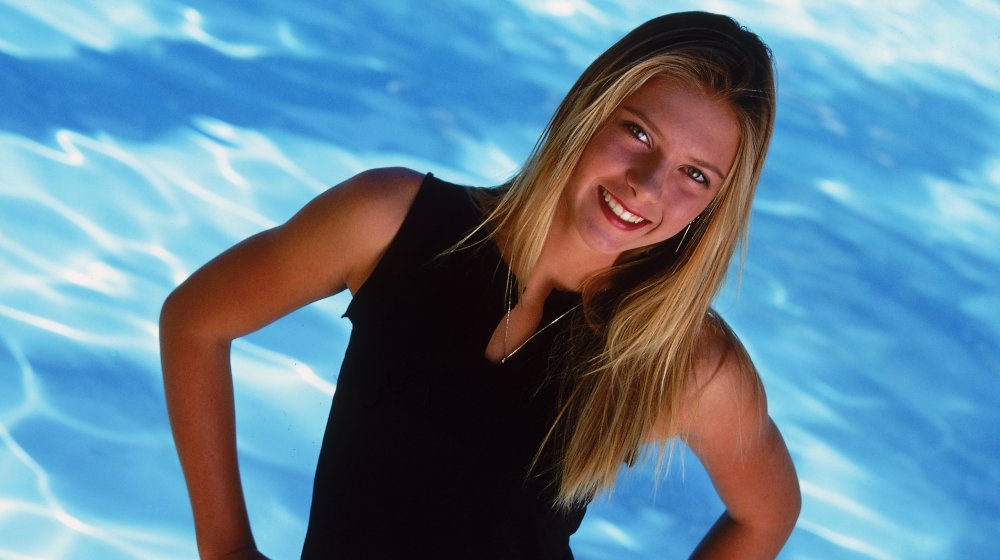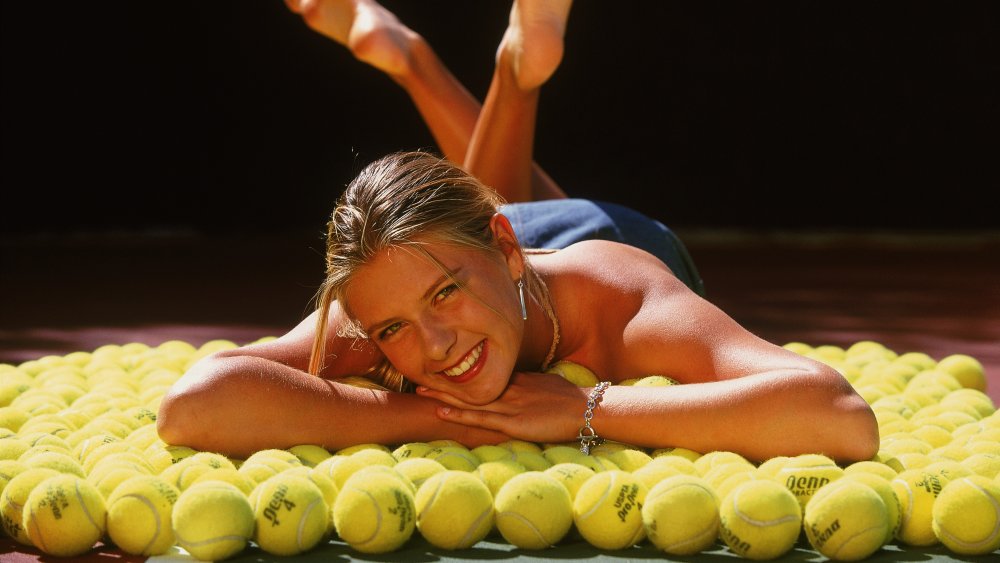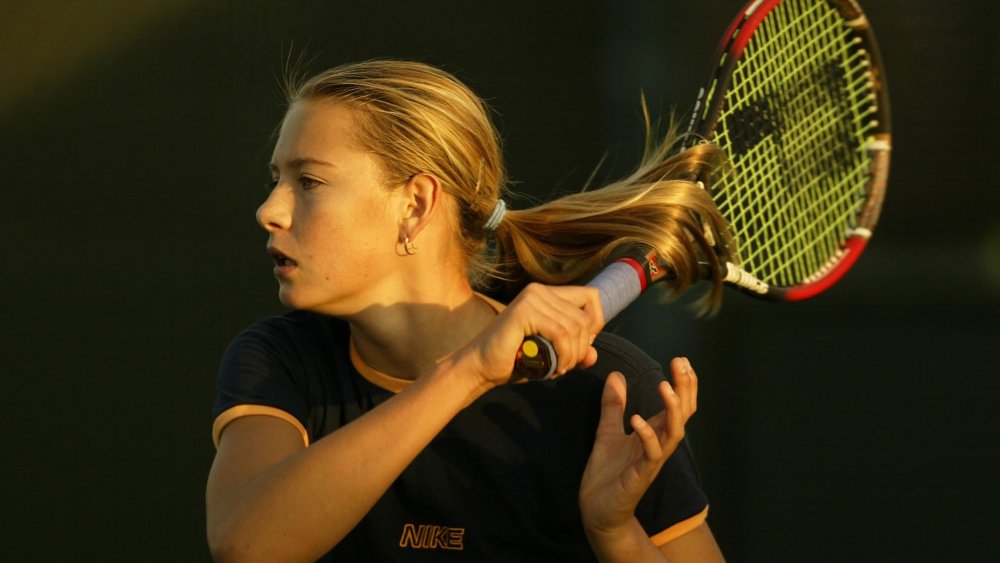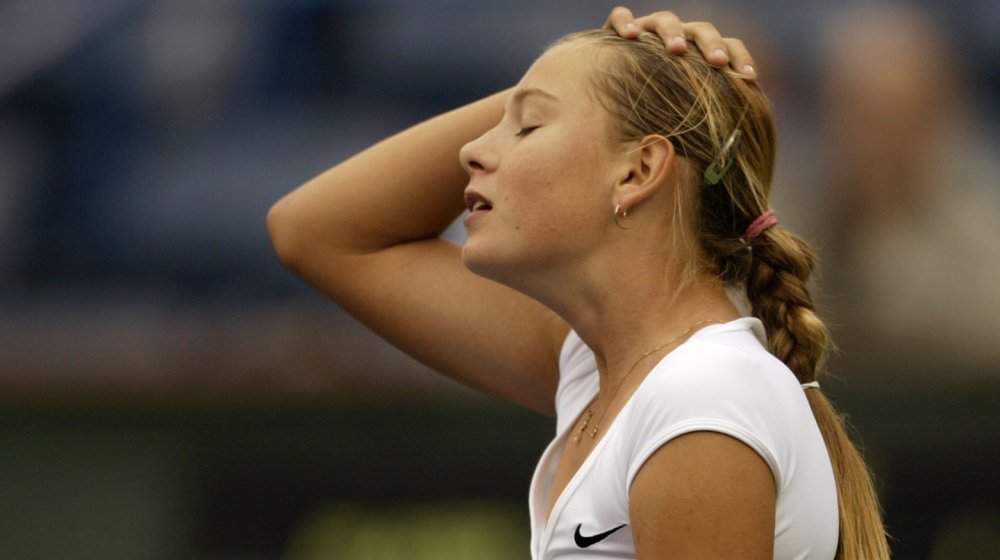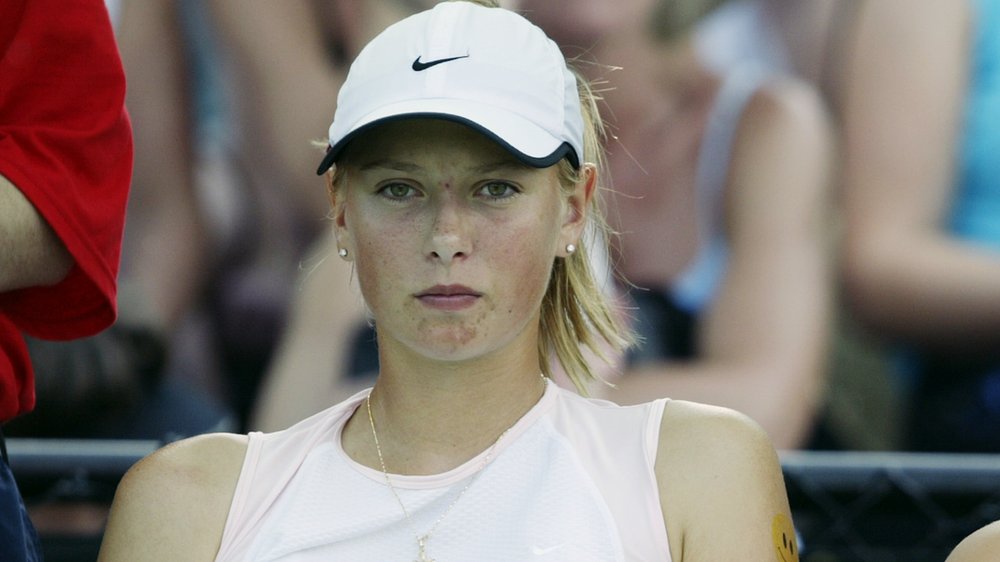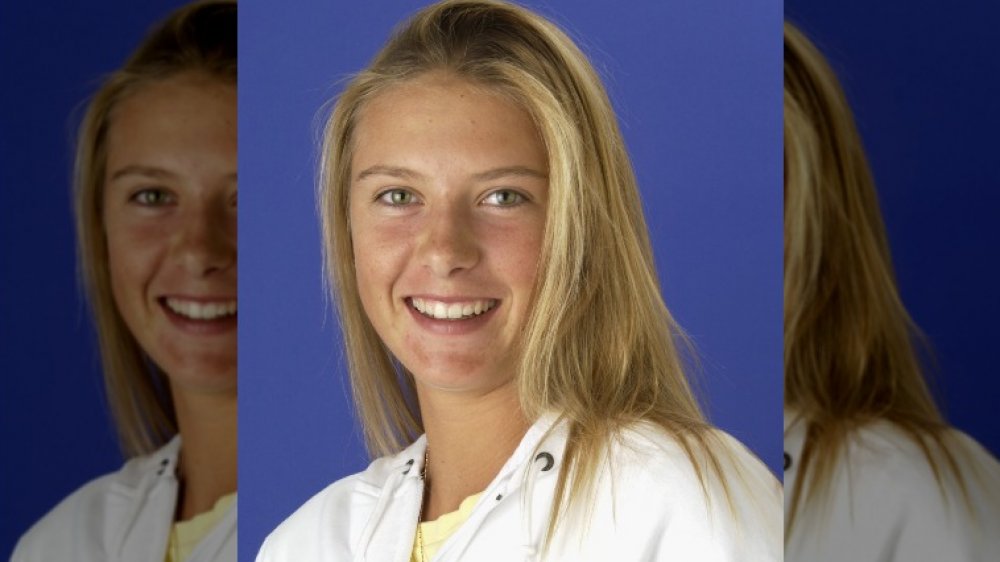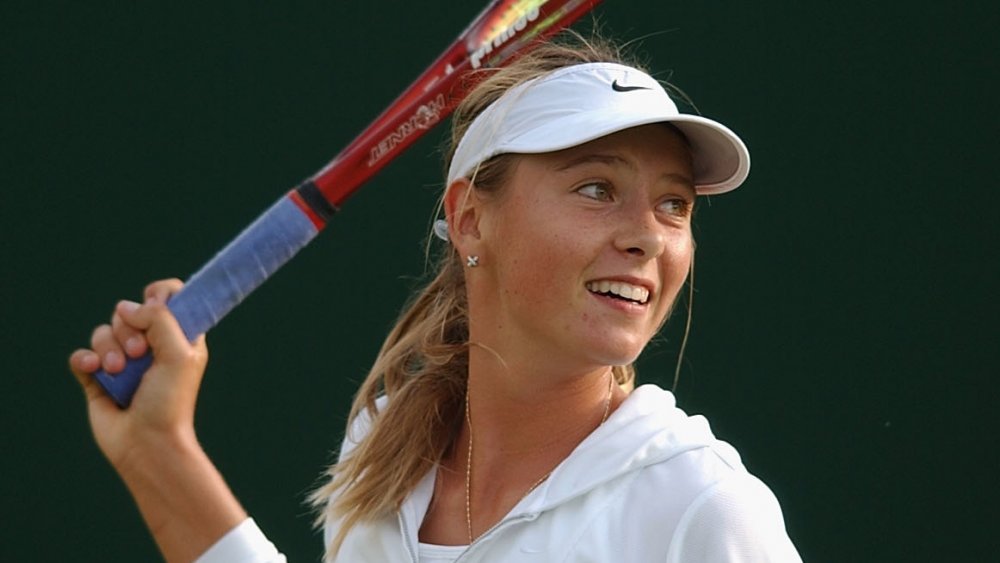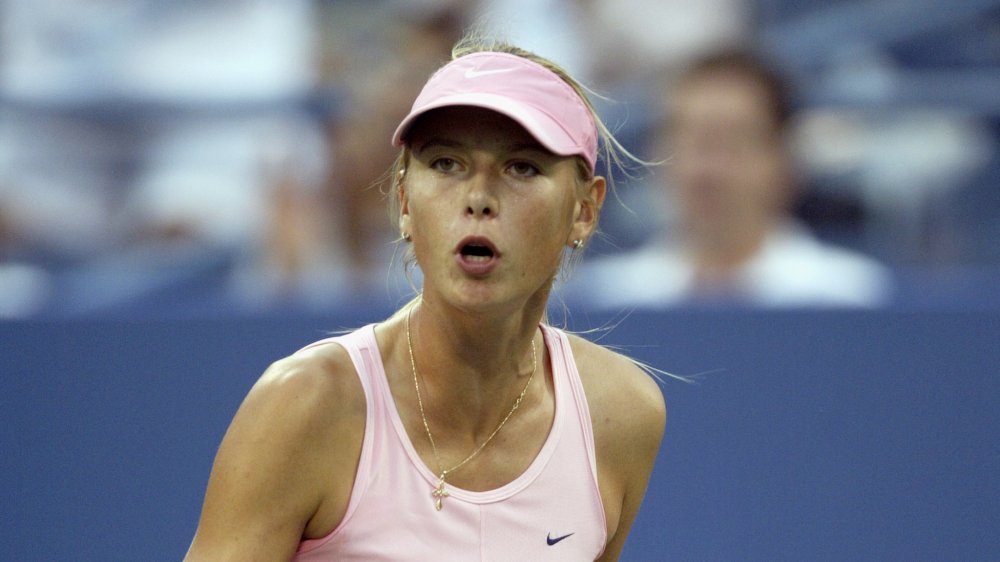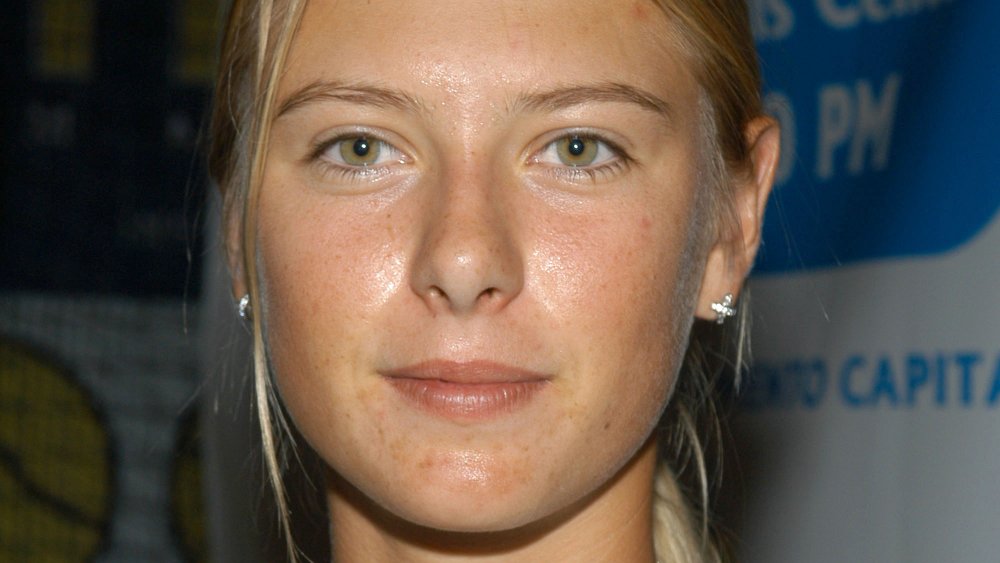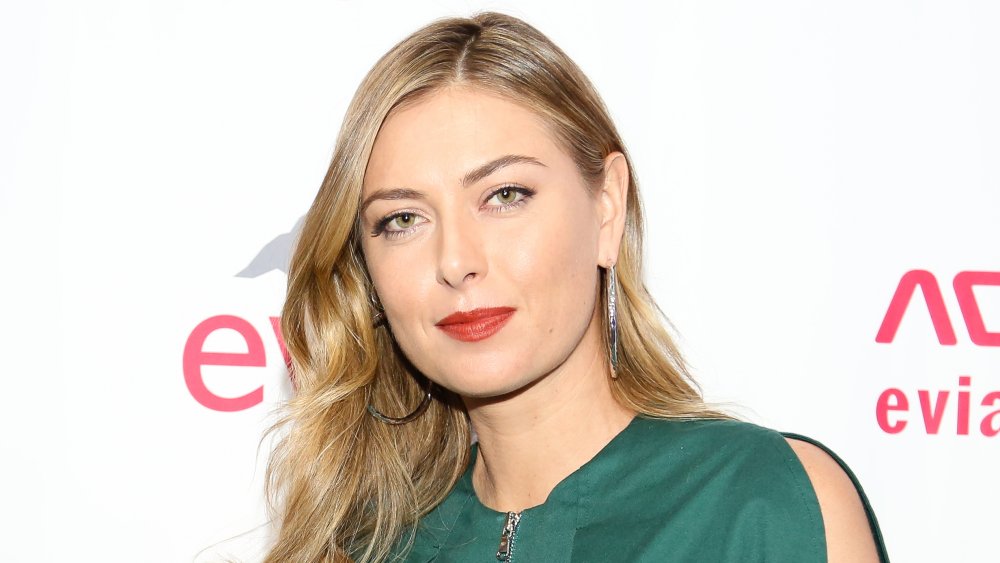The Stunning Transformation Of Maria Sharapova
Some people like Maria Sharapova are just destined to be great athletes — such as basketball legend Michael Jordan, Olympic swimmer Michael Phelps, and gymnast extraordinaire Simone Biles. Sharapova has had a decades-long career in professional tennis that has minted her as one of the highest-paid athletes in history, according to Fortune. That's a pretty impressive accomplishment, given all of the competition!
While Sharapova's decorated career is punctuated by a variety of significant wins, she wasn't born with a silver spoon in her mouth or her very own tennis court in the backyard — far from it. In fact, to truly understand the depth and breadth of Sharapova's incredible ascent into the athletic pantheon, you have to cross a literal ocean to see where her story began.
So where was Sharapova born, and where did she grow up? How did she discover that she was a tennis prodigy? And who's been by her side the entire time, making sure that she claims her rightful place in sports history? Read on to witness the stunning transformation of Maria Sharapova.
Maria Sharapova's mother had an unusual pregnancy
In the remote village of Nyagan, Siberia in the former USSR in 1987, Maria Sharapova made her big debut into the world. But as she tells it, Sharapova and her family weren't exactly happy in Nyagan due to its lack of amenities. "I was born in an industrial little city that didn't have much life and was just not a great environment to raise a child in," she recalled in an interview with DuJour magazine.
The family had relocated there a year prior at the behest of her grandparents, after the devastating nuclear disaster at Chernobyl rocked the world. "My parents were living in Belarus at the time so my mother was very close to all the radiation while being pregnant with me," she continued. That had to have been terrifying for her parents!
Four years after she was born, Sharapova moved with her parents from Siberia to the coastal city of Sochi, which had a lot more going on than Nyagan. Still, the USSR had just fallen apart at that time, so things weren't exactly idyllic.
At age 4, Maria Sharapova started playing tennis
For as difficult as things were growing up in post-USSR Russia, Maria Sharapova did have happy moments in her childhood, especially when it came to tennis. "The first time I remember seeing a tennis court, my father was playing on it," she penned in an essay for Vanity Fair. At the time, the then-4-year-old was so small in stature that her legs would dangle off of benches, and the racket she used was twice as big as she was.
But her diminutive size didn't stop the young Sharapova from pursuing tennis seriously, and it became clear quite quickly that she was blessed with extraordinary athletic prowess. "When I first started playing, the girls on the other side of the net were always older, taller, and stronger," she continued. "But little by little, with every day of practice on the court, this almost mythical world became more and more real."
Eventually Sharapova realized that she wasn't so different from the tennis greats she watched on television, and her dreams slowly started coming true.
In 1994, Maria Sharapova moved to the United States
When Maria Sharapova was only 6 years old, she and her father packed up and left Sochi to see if she had what it took to run with the big dogs, leaving her mother behind temporarily. "We came to America with only $700," she explained to ABC News. "While [my father] was trying to find ways to make money, I was at the big sporting academy in Florida just getting better and improving."
Specifically, Sharapova sharpened her skills at the famed Nick Bollettieri Tennis Academy, where tennis giants like the Williams sisters trained as well. So did another tall, blonde, Russian player: Anna Kournikova, whose hand-me-downs found their way to Sharapova. "I don't know how but I would end up with a lot of her old clothes," she revealed to DuJour magazine. "A lot of prints and animal prints and glitter and definitely not things I would've chosen to wear when I was 8 or 9 years old, but I didn't have a choice."
Maria Sharapova started playing professional tennis at 14
Moving to the United states and sacrificing everything they had for Maria Sharapova's tennis career may have been difficult for the athlete's family, but it was evident fairly soon after relocating that it was the right move for them. In fact, Sharapova was so good at the game that she turned pro at the tender age of 14, which is pretty young for any sport!
As coach Nick Bollettieri tells it, Sharapova's family did everything properly, allowing her to grow and thrive in just the right conditions. "Yuri found the right people who could help his daughter become the best tennis player possible," he told The Independent (via BBC News). "He has stayed right by her, giving her every support but crucially he let those people (the coaches) get on with their job."
It was only three years after turning pro that Sharapova would show the world what she truly had inside of her, ensuring that she would never be forgotten for the rest of tennis history.
Maria Sharapova defeated Serena Williams for her first Wimbledon win
In 2004, Maria Sharapova got to savor the ultimate bucket list victory: At 17, she took down legend Serena Williams in the Wimbledon final. "It was a shock to me," Sharapova revealed to The Guardian. "I never thought I was physically and mentally ready to last two weeks and seven matches against all kinds of opponents." But indeed she was, and she took home the coveted no. 1 prize when all was said and done.
Looking back, Sharapova remembers that stunning victory, acknowledging both how happy and fearless she felt after besting Williams to be crowned the champion. "Sometimes in life you get these little door openings," she continued, "and I just took it and played some great tennis." If you haven't seen the match, check it out, as both competitors showed some serious skill.
Sharapova would go on to face Williams many times on the court after that victory, in what became one of tennis' most notorious rivalries.
"Maria Mania" swept the tennis world in the 2000s
After Maria Sharapova's dramatic victory at Wimbledon in 2004, "Maria Mania" spread throughout the tennis community. Suddenly everyone wanted to know everything about the young star, who seemingly became world-famous overnight. "It was a tremendous victory, but also a very sudden amount of attention and responsibility," she explained in an interview with Sportsnet. "I was quite young, and there was a very strong drive to push myself even harder." Given that winning Wimbledon was a major goal for Sharapova, she had to think about what to strive for next in its wake.
While Sharapova enjoyed the attention and affection lavished upon her by the public, she also felt overwhelmed by some of the side effects. "I'm a very private person, and while I'm happy to be included in so many red-carpet moments, I do wish that's where the paparazzi following would end," she continued. She added that their constant presence was seriously invasive of not just her own privacy, but the privacy of her family and friends.
Maria Sharapova made her Olympic debut in 2012
After Wimbledon, Maria Sharapova continued to have an incredible career as a professional tennis player. She performed well in all kinds of tournaments, bringing home plenty of trophies and scoring a number of sponsorship deals. But it wasn't until 2012 that she took the Olympic stage for the first time, playing for Russia. "It's incredible, not only to be a part of this event and be an Olympian, but to put yourself in with an opportunity to go for gold," she revealed in an interview with ESPN. "It's a really nice feeling."
Once again, Sharapova faced her no. 1 rival in the semi-finals, Serena Williams, after beating Maria Kirilenko. "Obviously it's tough to play a Russian on the other side of the net, but I'm happy that one of us can go for gold," she continued.
However, a victory like Wimbledon in 2004 was not in the cards for Sharapova, as Williams defeated her to bring home the gold for herself. But Sharapova walked away with a silver medal, which is still something to be proud of!
In 2016, Maria Sharapova was suspended for doping
In 2016, Maria Sharapova found herself at the center of controversy: It was revealed that she tested positive for meldonium, a forbidden substance — and was banned from playing tennis for two years. "For the first hour, I thought it was a mistake," she confessed to The Guardian. She wondered, "How did I not know? How did my team not know? How did no one notify me?" Clearly, Sharapova had a lot of questions.
As it turned out, Sharapova wasn't doping intentionally, as her doctor had prescribed the medication to her years ago. And after she parted ways with him — ironically because she felt he wanted her to take too many drugs — she passed responsibility to her agent, who obviously didn't stay on top of things.
When the truth became clear, Sharapova's ban was reduced to 15 months by the courts. "I could have got pissed off with a lot of people, and that would have been fair for me, but it wouldn't have changed anything," she continued, adding, "If there's one person to get pissed at, for sure that would begin with myself."
Maria Sharapova began to appreciate her fans more after the doping scandal
One silver lining that came out of the doping scandal was that Maria Sharapova gained an entirely new appreciation of her fans. Before the incident, she said she wasn't exactly thrilled to have people asking her for autographs and selfies. "I didn't want the responsibility of being a role model," she explained to The Guardian. "Maybe it was a selfish thing."
But given how supportive Sharapova's fans were during her lowest time, it made her truly comprehend that her admirers are living, breathing people who just want to see her thrive in the tennis world. "That's one of the biggest reasons I've been able to come back," she continued. She noted, "I just found people's motive for coming up to me was more a message of support, not wanting something from me, which was really heartwarming."
Those personal encounters gave Sharapova sincere joy, and helped her feel better when she needed it the most.
Maria Sharapova founded her own candy line in 2016
So what did Maria Sharapova do with her time during her 15-month suspension? Rather than dwell on the negative or rest on her laurels, Sharapova instead got to work on her candy company. "I worked on Sugarpova consistently," she told ABC News. "I was investing in a few different businesses so I had time and then I got to spend the holidays at home which was such a treat for me." That sounds like a nice break on both counts!
Becoming an entrepreneur was a natural step for Sharapova, who'd been the face of various brands throughout her career; that spurred her to get going on a company of her own. She explained that she wanted to get "more competitive" with her business. She continued, "I want to be the one that's making more decisions, better decisions that can maybe benefit me in the long run."
Sharapova also realized that she won't be playing tennis forever, and she wanted to branch out.
Maria Sharapova is one of the highest-paid female athletes in the world
While Maria Sharapova and her father only had $700 when they came to America in the mid-1990s (via ABC News), that's definitely not the case any longer. In fact, Sharapova was the highest-paid female athlete in the world for 11 years running, according to Forbes magazine. Much of that was due to her lucrative sponsorship deals, though she's also won her fair share of prize money as well.
In 2016, Sharapova's bank account took a hit in the wake of the doping scandal, which resulted in some of her sponsors cutting ties with her. But clearly she was able to make a comeback, as she's worth a cool $180 million, according to Celebrity Net Worth.
Sharapova knows how to spend money, too, as her well-curated Los Angeles home is a dream come true, according to a profile in Architectural Digest. She also has a home in Sarasota, Fla., as noted by The Wall Street Journal. That's a long way from Siberia!
Throughout her career, Maria Sharapova struggled with injuries
One thing that Maria Sharapova has had to struggle with over the years are — you guessed it — injuries sustained while on the court. "Shoulder injuries are nothing new for me — over time my tendons have frayed like a string," she penned in a 2020 essay for Vanity Fair. "I've had multiple surgeries — once in 2008; another procedure last year — and spent countless months in physical therapy."
On one occasion, she even had to have her shoulder numbed just before playing at the U.S. Open in order to help her get through the match. "Just stepping onto the court that day felt like a final victory, when of course it should have been merely the first step toward victory," she continued. Ouch!
To that end, Sharapova knew she'd come to a crossroads and would need to figure out how to move forward, as her body "had become a distraction."
In 2020, Maria Sharapova finally retired
In 2020, Maria Sharapova finally made the big decision to retire from playing professional tennis. Naturally it was an emotional choice, one that she didn't make lightly or without deep reflection. "In giving my life to tennis, tennis gave me a life," she wrote in a piece for Vanity Fair. "I'll miss it everyday." But taking her injuries into consideration in addition to other ambitions, Sharapova knew it was time to step off of the court for good.
Sharapova described her long and celebrated career in tennis as a mountain, in that it's given her all sorts of memorable perspectives. "My path has been filled with valleys and detours, but the views from its peak were incredible," she continued. "After 28 years and five Grand Slam titles, though, I'm ready to scale another mountain — to compete on a different type of terrain."
Sharapova assured fans that she would continue to grow, no matter what her next chapter might be. She also shared her plans to enjoy the small things in life more, such as having weekend getaways and spending time with her family.
Through it all, Maria Sharapova is still a Russian citizen
Although Maria Sharapova has lived all but six years in the United States, she's said she'll never give up her Russian citizenship, according to CNBC. And though she couldn't imagine permanently relocating back in Russia, she's not 100 percent at home in America, either. "I've spent all my life living out of suitcases, and even though I have a home here in Florida and a home in California, I don't feel this is my place," she revealed in an interview with The Guardian. "I'm not attached to things."
That doesn't mean she doesn't love the United States, however, because she says she very much does — she just feels attached to both cultures in different ways. "In my home, I feel very much Russian," she continued. "At home, I speak Russian. But outside of it, I feel very much American."
Fortunately in retirement, Sharapova will have time to spend in both places.
